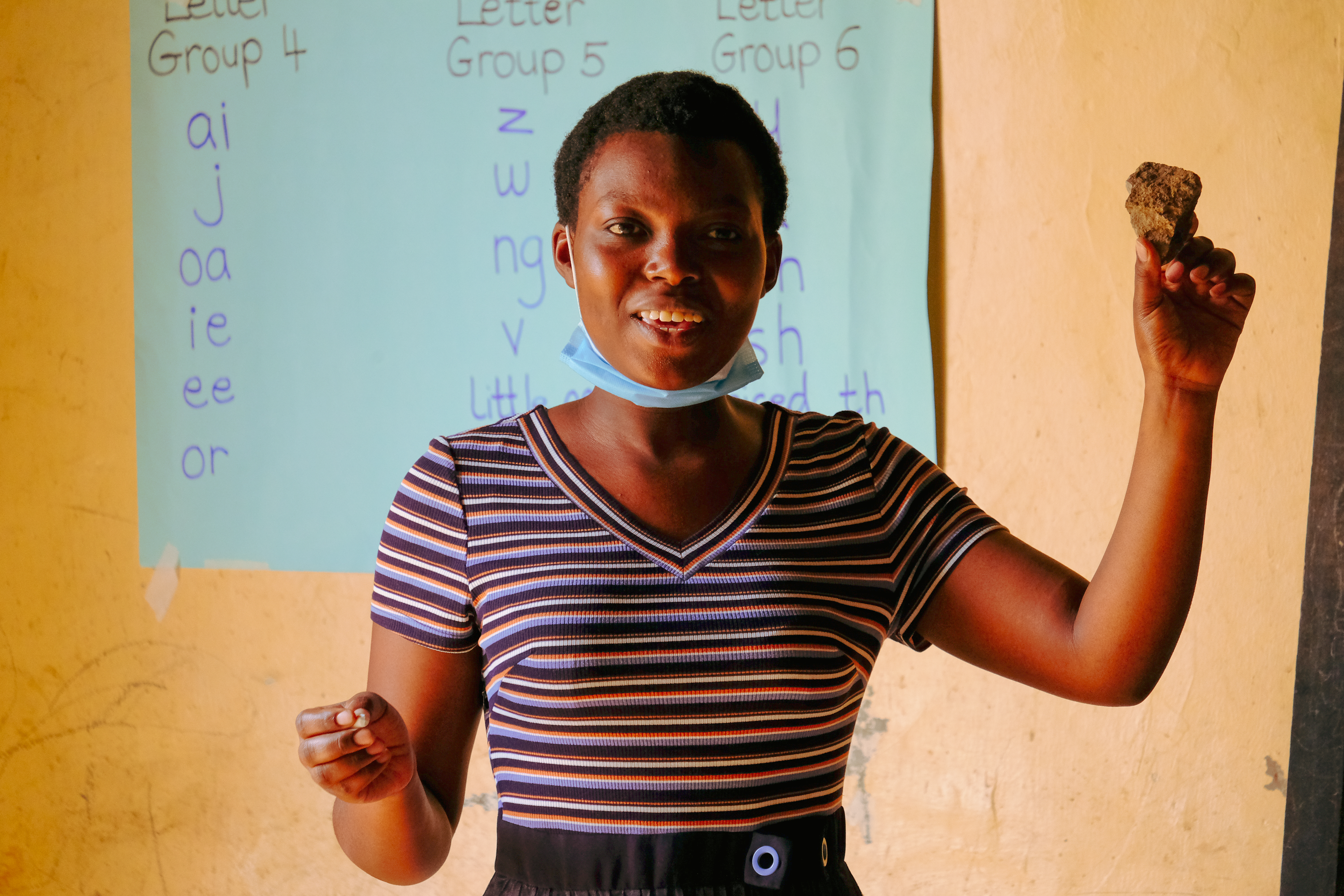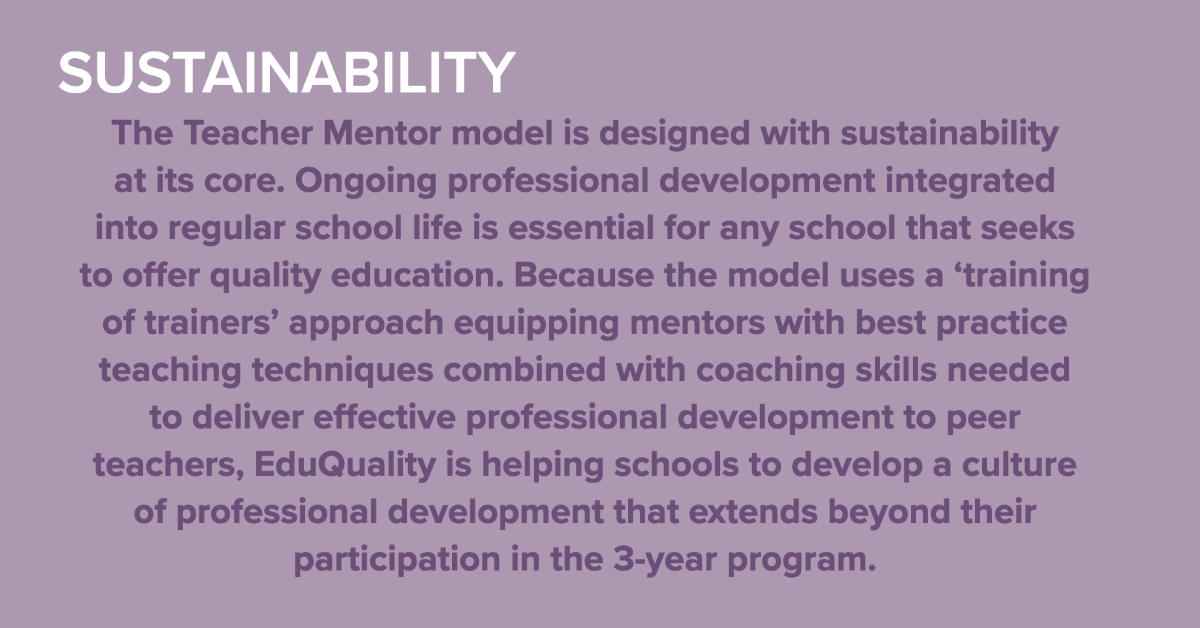Teachers training Teachers in Kenya: Teacher Mentor Professional Development

It is best practice for teachers to have regular access to ongoing professional development opportunities. In Kenya, with the rollout of the competency-based curriculum (CBC) in 2018, teacher professional development was key to equipping teachers with the skills needed to deliver the new curriculum. Yet for many affordable non-state schools this training has been out of reach, leaving teachers less equipped to deliver child-centered quality instruction that achieves the learning outcomes intended by the national curriculum.
In early 2022, the Government of Kenya announced that all teachers must attend mandatory professional development sessions, which are usually at a cost of US$60+ per teacher, which is very expensive for many.
The Teacher Mentor Professional Development training offered through the EduQuality program is extremely timely and well-aligned with the Ministry of Education’s strategy. As most non-state schools do not benefit from a professional network the way that state schools do, this is often one of the first times teachers are able to interact with peer educators outside of their own school.
Leading Teacher Mentor Professional Development in Kenya
Opportunity EduFinance began offering Teacher Mentor Professional Development (TMPD) through our EduQuality programme in Kenya in early 2021. Training is delivered through a ‘blended learning model’ that uses both highly interactive in-person training sessions combined with self-access digital resources via tablets.
Teacher mentors are selected by their school leader to participate in the 3-year schedule of interactive training sessions led by our Education Specialists, who are all former educators themselves. Mentors then deliver each of these same training sessions to their peer educators at their respective schools.
A key element of the training is that teacher mentors learn how to coach their fellow teachers and help them integrate new teaching techniques and best practices into their classrooms.

Affordable Non-State Schools are eager for a Peer Network
After offering the new 3-year EduQuality program to schools in early 2021 - as many were still struggling to recover from the pandemic – some previous partner schools opted out. Most were facing overwhelming challenges and struggling to recover after months of school closures.
In the first year, 121 schools rejoined the 3-year program. However, after nearly a year of programming, a number of those schools that declined reached back out to their Education Specialists and requested to rejoin the program, feeling more stable and eager to benefit from the training and peer networking they were hearing about from school leaders in the program.
Though not regular practice to add in new schools to an already in-progress school cohort, the team agreed and welcomed them back. School cluster leaders stepped up and mentored the new schools, including their newly selected teacher mentors, helping them catch up on the training content missed in the first year and re-establish their relationships with their school cluster members.
Today the Kenya EduQuality program is proud to partner with 134 schools, including 337 teacher mentors.
1.5 Years In: How are Teacher Mentors responding?
Over the last year and a half, the Kenya EduSpecialist team report very encouraging engagement from Teacher Mentors. They are actively participating in training sessions after overcoming initial apprehension, increasing collaboration with their peers in surprising ways, and demonstrating real trust and networking.
- Professionalism & Confidence – Teachers have shifted the way they present themselves in sessions. After initial apprehension, mentors are showing increased confidence and professionalism with their peers, as they end each session with mock practice exercises using new teaching techniques.
- Peer-to-Peer Collaboration – EduSpecialists are observing significant collaboration now between teacher mentors within their clusters, as they have started sharing both professional and personal information with their mentor peer networks beyond the guidance of the EduSpecialists.
- Student Engagement – Mentors report that after integrating the new teaching techniques into their classroom instruction, they are finding success with increased student engagement.
- Teacher Mentor Retention – EduSpecialists are reporting high attendance rates at training sessions and lower teacher turnover rates among the mentor cohort compared to previous years. School leaders have also begun attributing the retention of teacher mentors to their opportunity to participate in professional development.
- Positive Behaviour Management – Recently, the Chief Justice in Kenya said publicly that schools cannot do away with caning. This was a very unfortunate development, as it validates the traditional discipline approach already practiced by many schools. EduFinance continues to deliver training on why this approach is both harmful for the learner and also does not have the successful outcomes that positive behaviour management can have. Teachers have already tested the two new positive behaviour strategies shared in a session, and are now requesting more techniques which demonstrates their strong interest in shifting this practice.
- Engaging with Phonics – To date, teacher mentors have participated in the first of several phonics best practice training sessions. The EduSpecialist team reported that all sessions went longer than expected, as mentors were extremely engaged, curious and eager to ask many questions. This strong early engaged is a positive indicator that mentors may be eager to integrate phonics into their instruction and deliver the same training and coaching to their peers.
TEACHER MENTOR OF THE MONTH: May 2022

Ms. Caroline Achieng Nyango works in the Friends Junior School, which offers education to more than 150 pre-school and primary aged learners.
In their 2021 school development plan, the school’s leadership identified their goal to focus on improving the quality of their education through their teachers.
Ms. Caroline led an initiative to develop templates for lesson planning and then held meetings to introduce them to her peers.
She also began by observing classroom lessons and coaching teachers on strategies that she was taught in her first year as a teacher mentor. Ms. Caroline expressed the excitement that both she and her peers now have for holding conversations about the lessons. She noted that the coaching tools provided by EduQuality on her tablet help her coach and mentor teachers professionally, which she greatly enjoys.
How are Teacher Mentors feeling about their Mentorship Role?
While mentors have increased in their engagement with the training and new teaching techniques, they initially expressed concerns about how their peers would receive the trainings, and more specifically classroom observations and coaching. Mentors believed their peers would see it as a performance assessment to be feared or be defensive about.
- Delivering Peer Professional Development – To date, most teacher mentors have reported delivering training to their peers on the same session topics they are learning from their EduSpecialists. Mentors have sent short videos and audio clips on WhatsApp to their clusters, now eager to share how their trainings are progressing. Mentors and their school leaders are encouraged to schedule time for teacher trainings within 1 week of their own session, so that the content is still fresh in their minds.
- Coaching Success - After attending the ‘Leading Coaching’ session, mentors that were initially concerned about coaching their peers have reported their peers are responding well to the coaching approach and even starting to ask more challenging questions in an effort to learn more from the mentors. Mentors are attributing success to the constructive coaching language they learned, helping peer teachers understand the focus is on new techniques specifically, rather than a broad performance management style observation.
- Confidence & Pride - Mentors are reporting more confidence and pride in their mentorship role, as they are being increasingly seen as ‘key resource’ people within their school,able to brainstorm with other peers and help them identify solutions to the challenges they face in the classroom. As teachers feel more pride in their career paths as educators, they are choosing to stay in their schools rather than job search and jump to other schools that may not offer them the same professional development opportunities.
- Questions & Engagement - An unforeseen but positive issue that mentors did have is that teachers have questions they did not anticipate and that cannot be answered directly during the sessions. As a solution, the mentors are engaging more with the EduSpecialists to discuss appropriate answers that they then report back to the teachers, further increasing mentors’ engagement with learning and coaching.
Opportunity EduFinance will continue to share our learnings from our partnership with schools in Kenya and our other countries of operation. To learn more about ways we are monitoring changes in classroom instruction with our school partners, check out our blog and Key Insight on baseline classroom observation analysis.